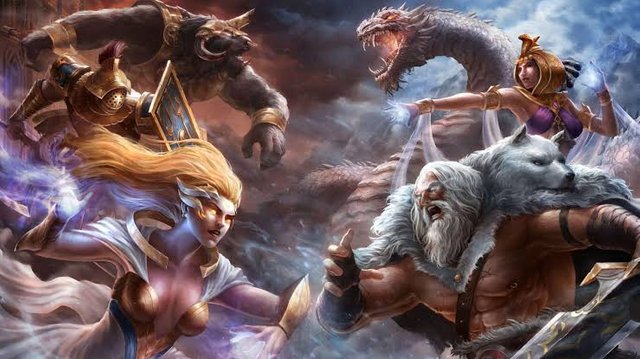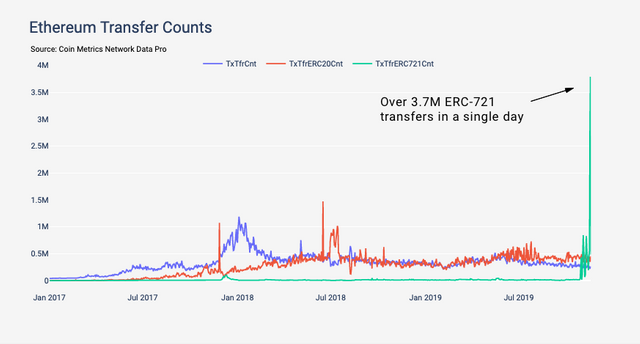
Trading card game Gods Unchained is the biggest revolution to happen to blockchain games since the Cryptokitties hype. Where collecting digital kittens made sure that the entire Ethereum network was clogged, the card game is causing no problems at all. However, Gods Unchained is activating way more smart contracts and required much more transactions. What has changed between late 2017 and late 2019?
It all started with Cryptokitties
When developer Axiom Zen launched Cryptokitties in October 2017, it was just a fun experiment with early blockchain technology. The crypto industry was at the beginning of an enormous bull run and every day the value jumped up a few percent. Cryptokitties users breed and trade unique digital kittens. The game became way too popular for something that was meant as a fun experiment.
The game became a hype, and some kittens were sold for prices into six figures. A genesis kitten was sold for 117 thousand dollars, while many other cats were also sold at car values. This is the news that hit mainstream media, but at the same time the increased hype came with even more traffic.
Ethereum couldn't handle the kitties
By December there were so many transactions, that the game was clogging the entire Ethereum network. On December 4th Cryptokitties was responsible for almost 12 percent of all transactions on the Ethereum network. The amount of pending transactions on the network had multiplied almost ten times within just a few days. It caused a fear that the entire Ethereum blockchain would fail, even before it could fully live up to its promise.
The Cryptokitties team worked with Metamask and other Ethereum developers to come up with quick solutions for scaling the game. Miners had already increased their fees, and as a result the birthing fee for a kitten doubled to 0.002 ETH. At the same time the developers tried to communicate more clearly about waiting times, network congestion and transaction fees. It became very clear that scale was the major challenge for Ethereum developers, if they ever wanted to reach true mainstream adoption.
Sending a few ETH, BTC or LTC is fun and can provide traders some good revenue. But trading is not the same as mainstream adoption. When millions of people need to pay their groceries, phone bills and cinema tickets using cryptocurrencies, the network needs to be able to deal with millions of transactions per minute. Decentralized platforms need to deliver the speed and scale from the most popular internet applications. Scaling solutions are a driving force towards mainstream adoption of blockchain technology and cryptocurrency payments.
Cryptokitties VS Gods Unchained
Cryptokitties clogged the Ethereum network with its 4.7 million transactions. Game studio Immutable transferred six million cards in just three days, but the Ethereum network wasn't impressed. Nobody noticed that the blockchain has seen more digital collectibles transferred in history. Fees didn't go up. Waiting times didn't increase. The blockchain games revolution set in motion by Gods Unchained started unnoticed. Only those who dive into blockchain analytics would've witnessed these record breaking transactions.
These were possible because of Immutable putting multiple token transfers into one batch. As a result they minted six million cards and transferred them to their owners, without putting pressure on the blockchain. The only moment Gods Unchained caused slight troubles, was went it launched its open marketplace on November 22nd. According to Coin Metrics some blocks required $30 of fees. After a few hours things went back to regular sub $1 levels.

Gamers can trade Gods Unchained cards on the in-game marketplace and on OpenSea. Ever since the marketplace opened, over 52 thousand cards have been sold. The most expensive cards go for over $1000, while most cards are just a few dollars. In less than a week the trading card game had over 2100 ETH in trading volume. As a result it has the number one spot on the OpenSea marketplace.
Even though the Ethereum blockchain still has lots of work to do when it comes to scaling, it's moving in the right direction. Gods Unchained is already a bigger product than Cryptokitties ever was, even though its user base is much smaller. Currently approximately ten thousand addresses own Gods Unchained cards, while almost ninety thousand addresses have kitties.
Gods Unchained just launched. Immutable wants to attract millions of gamers, while currently attracting just a few thousand. The true blockchain revolution for Gods Unchained hasn't even started yet. However, to deal with millions of users something will need to change.
Scaling solutions and second layers
Immutable decided to batch their minting transactions into bigger packages. That way they expected not to clog the Ethereum blockchain. Had they send every card separately, they would've clogged the Ethereum blockchain for months. Batching transactions is one smart one to put less pressure on the blockchain.
The problem with public blockchains, like Ethereum and Bitcoin, is that every node needs to process every transaction. Currently there are many solutions in development that could help with this problem. Second layer solutions can help to decrease transaction fees, while putting less stress on the blockchain. These extra layers can take care of transactions, while communicating the result of their work to Layer-1, the main network.
This is something that the Lightning Network is doing for Bitcoin. It's also worth noting that the technology Lightning Labs is working on, can be applied to other blockchain projects. As a matter of fact, it could even prove to be a useful tool for cross-blockchain transactions, using atomic swaps. They call this a Layer-2 solution.
Blockchain scaling solutions
Earlier this month decentralized exchange IDEX claimed to have created an 'infinite scaling solution' for the Ethereum network. The exchange's CEO Alex Wearn also suggested that their technology 'can match the throughput of Visa'. In addition it would allow for free transactions of ERC-721 tokens, like the cards in Gods Unchained.
IDEX calls its invention Optimized Optimistic Rollups (O2Rs), which is a pun to Plasma Group's Optimistic Rollups (ORs). They even claim that their technology is one thousand times faster, and reaches 'block finality' in ten minutes. Plasma Group's ORs achieves block finality in two weeks. Both solutions do certain computations off-chain, and push the result to the network later. At the same time validators analyze the data and make sure nothing is corrupted.
There are multiple solutions for the same problem. For example, Plasma is the idea of small blockchains attached to bigger ones. Thousand of users can use this smaller blockchain, while the smaller blockchain only communicates necessary information to the main blockchain. State channels are another solution. Here participants communicate and transact, while only the summary of their interaction is send to the main blockchain.
Both solutions are already active. Lightning Labs uses the concept of state channels for the Bitcoin Lightning Network. While Loom Network is using the idea of child blockchains. Their blockchain is build on top of other chains, including Bitcoin, Ethereum and Tron. Developers using Loom need to pay a monthly fee, so that their users don't have to.
Blockchains are programmable
Ethereum is still Ethereum. The number two cryptocurrency will soon get a major update. As a result it will embrace sharding, Proof-of-Stake (PoS) and a new virtual machine. The Ethereum developers will launch these updates in several phases. They planned the first one for the first quarter of 2020.
At the same time Bitcoin has changed over the years as well. But Bitcoin is still Bitcoin. These cryptocurrencies and blockchain are programmable. Developers can come up with new solutions to tackle problems. Developers can and will solve the scaling problem this way.
Blockchain technology is now in its toddler years. It's learning to discover the world, communicate and walking around. When it falls, it will stand back up, learn from the experience and continue going.
Gods Unchained leading the new wave
Personally I love Gods Unchained. If you didn't try it yet, give it a go. Not everybody will enjoy playing a trading card game, and that's fine. What this new blockchain game has shown, is that the crypto industry has matured. It has been able to learn from its mistakes and grow up.
The Ethereum network has been able to deal with an insane amount of transactions. Gods Unchained has become the latest showcase of what blockchain games can do. On top of that trading digital collectibles are currently more popular than ever before. Nowadays there's so much more available, and Cryptokitties is just one of them.
At the horizon
In the coming months more games will launch on a variety of blockchains. F1 Delta Time is one of the biggest games coming from Animoca Brands. In addition Battle Racers is looking like some good fun as well. Fans of card games already have Gods Unchained, but Tides of Magic utilizes some cross-game cards as well. For example, people who play Axie Infinity, might see their Axies turned into an unique playing card!
Blockchain technology is moving, growing, learning to walk and talk. This doesn't always go smoothly, but it's happening. Cryptokitties was the first wave of blockchain games, and Gods Unchained has now taken the crown. For now Gods Unchained is leading the blockchain gaming revolution, and maybe the next wave will be led by major gaming companies like Ubisoft.
Posted from my blog: https://www.nederob.nl/2019/11/28/gods-unchained-biggest-blockchain-games-revolution/